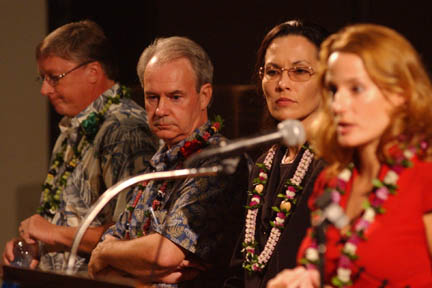

|
Parent concerns delay
Mid-Pac drug screening
The school plans first to address
warnings issued by experts
Facing resistance from a group of parents, Mid-Pacific Institute is postponing a decision on whether to become the first school in the state to begin randomly testing students for drug use.
"I'm still very much in favor of the program, but I want to be able to answer the concerns that people have," Mid-Pacific President Joe Rice said yesterday. "You don't want to rush into something if there are questions left unanswered."
The school had planned to announce yesterday whether it would launch the voluntary testing when the second semester begins in January. Rice said he could not predict when it would make a decision.
The proposal is based on a urine-testing program begun two years ago at San Clemente High School in California. Both parent and student must consent to the test, and only parents are notified of their child's results.
Mid-Pacific administrators say the system would promote discussion within families about drug use and give students a reason to say no when pressured to use drugs. Many Mid-Pacific parents are eager to try it, but others oppose it.
At a meeting called last week by parents against the plan, a panel of professionals argued that even voluntary drug testing could do more harm than good.
Dr. Robert Bidwell, a pediatrician at Kapiolani Medical Center who specializes in adolescents, said he understands the urge to "do something" about drug use, but said there is no evidence to suggest drug testing in schools deters abuse. He also warned about the consequences of false positives.
"Drug scanning seems to be a very blunt instrument, ineffective and potentially harmful," he said. "It is an implicit statement of mistrust between the school and the child, and the parent and the child."
Katherine Irwin, an assistant professor of sociology at the University of Hawaii at Manoa, urged the school to consider programs that have been scientifically proved to work rather than gamble on a politically popular but untested method. She pointed to model programs approved by the Substance Abuse and Mental Health Administration that have been rigorously tested and show long-term benefits, such as "Life Skills Training" and "Too Good for Drugs."
Attorney Lerisa Heroldt, whose two teenagers attend Mid-Pacific, warned that the school could expose itself to legal liability through violations of privacy and breach of contract with parents.
"By changing the rules in the middle of the school year, Mid-Pacific is not the same institution we enrolled our children in," she said. "Drug testing of students teaches students they are guilty until proved innocent. It shows little regard to their right to privacy."
Rice said the school would look into such questions as false positives, privacy concerns and alternative programs.